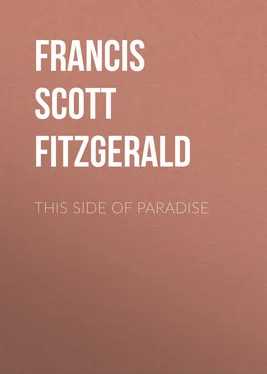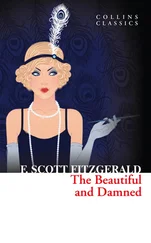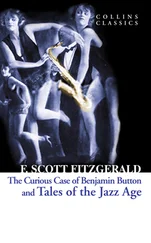Francis Fitzgerald - This Side of Paradise
Здесь есть возможность читать онлайн «Francis Fitzgerald - This Side of Paradise» — ознакомительный отрывок электронной книги совершенно бесплатно, а после прочтения отрывка купить полную версию. В некоторых случаях можно слушать аудио, скачать через торрент в формате fb2 и присутствует краткое содержание. Жанр: literature_20, foreign_prose, Зарубежные любовные романы, на английском языке. Описание произведения, (предисловие) а так же отзывы посетителей доступны на портале библиотеки ЛибКат.
- Название:This Side of Paradise
- Автор:
- Жанр:
- Год:неизвестен
- ISBN:нет данных
- Рейтинг книги:4 / 5. Голосов: 1
-
Избранное:Добавить в избранное
- Отзывы:
-
Ваша оценка:
- 80
- 1
- 2
- 3
- 4
- 5
This Side of Paradise: краткое содержание, описание и аннотация
Предлагаем к чтению аннотацию, описание, краткое содержание или предисловие (зависит от того, что написал сам автор книги «This Side of Paradise»). Если вы не нашли необходимую информацию о книге — напишите в комментариях, мы постараемся отыскать её.
This Side of Paradise — читать онлайн ознакомительный отрывок
Ниже представлен текст книги, разбитый по страницам. Система сохранения места последней прочитанной страницы, позволяет с удобством читать онлайн бесплатно книгу «This Side of Paradise», без необходимости каждый раз заново искать на чём Вы остановились. Поставьте закладку, и сможете в любой момент перейти на страницу, на которой закончили чтение.
Интервал:
Закладка:
“Chocolate sundae,” he told a colored person.
“Double chocolate jiggah? Anything else?”
“Why – yes.”
“Bacon bun?”
“Why – yes.”
He munched four of these, finding them of pleasing savor, and then consumed another double-chocolate jigger before ease descended upon him. After a cursory inspection of the pillow-cases, leather pennants, and Gibson Girls that lined the walls, he left, and continued along Nassau Street with his hands in his pockets. Gradually he was learning to distinguish between upper classmen and entering men, even though the freshman cap would not appear until the following Monday. Those who were too obviously, too nervously at home were freshmen, for as each train brought a new contingent it was immediately absorbed into the hatless, white-shod, book-laden throng, whose function seemed to be to drift endlessly up and down the street, emitting great clouds of smoke from brand-new pipes. By afternoon Amory realized that now the newest arrivals were taking him for an upper classman, and he tried conscientiously to look both pleasantly blasé and casually critical, which was as near as he could analyze the prevalent facial expression.
At five o’clock he felt the need of hearing his own voice, so he retreated to his house to see if any one else had arrived. Having climbed the rickety stairs he scrutinized his room resignedly, concluding that it was hopeless to attempt any more inspired decoration than class banners and tiger pictures. There was a tap at the door.
“Come in!”
A slim face with gray eyes and a humorous smile appeared in the doorway.
“Got a hammer?”
“No – sorry. Maybe Mrs. Twelve, or whatever she goes by, has one.”
The stranger advanced into the room.
“You an inmate of this asylum?”
Amory nodded.
“Awful barn for the rent we pay.”
Amory had to agree that it was.
“I thought of the campus,” he said, “but they say there’s so few freshmen that they’re lost. Have to sit around and study for something to do.”
The gray-eyed man decided to introduce himself.
“My name’s Holiday.”
“Blaine’s my name.”
They shook hands with the fashionable low swoop. Amory grinned.
“Where’d you prep?”
“Andover – where did you?”
“St. Regis’s.”
“Oh, did you? I had a cousin there.”
They discussed the cousin thoroughly, and then Holiday announced that he was to meet his brother for dinner at six.
“Come along and have a bite with us.”
“All right.”
At the Kenilworth Amory met Burne Holiday – he of the gray eyes was Kerry – and during a limpid meal of thin soup and anaemic vegetables they stared at the other freshmen, who sat either in small groups looking very ill at ease, or in large groups seeming very much at home.
“I hear Commons is pretty bad,” said Amory.
“That’s the rumor. But you’ve got to eat there – or pay anyways.”
“Crime!”
“Imposition!”
“Oh, at Princeton you’ve got to swallow everything the first year. It’s like a damned prep school.”
Amory agreed.
“Lot of pep, though,” he insisted. “I wouldn’t have gone to Yale for a million.”
“Me either.”
“You going out for anything?” inquired Amory of the elder brother.
“Not me – Burne here is going out for the Prince – the Daily Princetonian, you know.”
“Yes, I know.”
“You going out for anything?”
“Why – yes. I’m going to take a whack at freshman football.”
“Play at St. Regis’s?”
“Some,” admitted Amory depreciatingly, “but I’m getting so damned thin.”
“You’re not thin.”
“Well, I used to be stocky last fall.”
“Oh!”
After supper they attended the movies, where Amory was fascinated by the glib comments of a man in front of him, as well as by the wild yelling and shouting.
“Yoho!”
“Oh, honey-baby – you’re so big and strong, but oh, so gentle!”
“Clinch!”
“Oh, Clinch!”
“Kiss her, kiss ‘at lady, quick!”
“Oh-h-h – !”
A group began whistling “By the Sea,” and the audience took it up noisily. This was followed by an indistinguishable song that included much stamping and then by an endless, incoherent dirge.
“Oh-h-h-h-h
She works in a Jam Factoree
And – that-may-be-all-right
But you can’t-fool-me
For I know – DAMN – WELL
That she DON’T-make-jam-all-night!
Oh-h-h-h!”
As they pushed out, giving and receiving curious impersonal glances, Amory decided that he liked the movies, wanted to enjoy them as the row of upper classmen in front had enjoyed them, with their arms along the backs of the seats, their comments Gaelic and caustic, their attitude a mixture of critical wit and tolerant amusement.
“Want a sundae – I mean a jigger?” asked Kerry.
“Sure.”
They suppered heavily and then, still sauntering, eased back to 12.
“Wonderful night.”
“It’s a whiz.”
“You men going to unpack?”
“Guess so. Come on, Burne.”
Amory decided to sit for a while on the front steps, so he bade them good night.
The great tapestries of trees had darkened to ghosts back at the last edge of twilight. The early moon had drenched the arches with pale blue, and, weaving over the night, in and out of the gossamer rifts of moon, swept a song, a song with more than a hint of sadness, infinitely transient, infinitely regretful.
He remembered that an alumnus of the nineties had told him of one of Booth Tarkington’s amusements: standing in mid-campus in the small hours and singing tenor songs to the stars, arousing mingled emotions in the couched undergraduates according to the sentiment of their moods.
Now, far down the shadowy line of University Place a white-clad phalanx broke the gloom, and marching figures, white-shirted, white-trousered, swung rhythmically up the street, with linked arms and heads thrown back:
“Going back – going back,
Going – back – to – Nas-sau – Hall,
Going back – going back —
To the – Best – Old – Place – of – All.
Going back – going back,
From all – this – earth-ly – ball,
We’ll – clear – the – track – as – we – go – back —
Going – back – to – Nas-sau – Hall!”
Amory closed his eyes as the ghostly procession drew near. The song soared so high that all dropped out except the tenors, who bore the melody triumphantly past the danger-point and relinquished it to the fantastic chorus. Then Amory opened his eyes, half afraid that sight would spoil the rich illusion of harmony.
He sighed eagerly. There at the head of the white platoon marched Allenby, the football captain, slim and defiant, as if aware that this year the hopes of the college rested on him, that his hundred-and-sixty pounds were expected to dodge to victory through the heavy blue and crimson lines.
Fascinated, Amory watched each rank of linked arms as it came abreast, the faces indistinct above the polo shirts, the voices blent in a paean of triumph – and then the procession passed through shadowy Campbell Arch, and the voices grew fainter as it wound eastward over the campus.
The minutes passed and Amory sat there very quietly. He regretted the rule that would forbid freshmen to be outdoors after curfew, for he wanted to ramble through the shadowy scented lanes, where Witherspoon brooded like a dark mother over Whig and Clio, her Attic children, where the black Gothic snake of Little curled down to Cuyler and Patton, these in turn flinging the mystery out over the placid slope rolling to the lake.
Princeton of the daytime filtered slowly into his consciousness – West and Reunion, redolent of the sixties, Seventy-nine Hall, brick-red and arrogant, Upper and Lower Pyne, aristocratic Elizabethan ladies not quite content to live among shopkeepers, and, topping all, climbing with clear blue aspiration, the great dreaming spires of Holder and Cleveland towers.
Читать дальшеИнтервал:
Закладка:
Похожие книги на «This Side of Paradise»
Представляем Вашему вниманию похожие книги на «This Side of Paradise» списком для выбора. Мы отобрали схожую по названию и смыслу литературу в надежде предоставить читателям больше вариантов отыскать новые, интересные, ещё непрочитанные произведения.
Обсуждение, отзывы о книге «This Side of Paradise» и просто собственные мнения читателей. Оставьте ваши комментарии, напишите, что Вы думаете о произведении, его смысле или главных героях. Укажите что конкретно понравилось, а что нет, и почему Вы так считаете.












